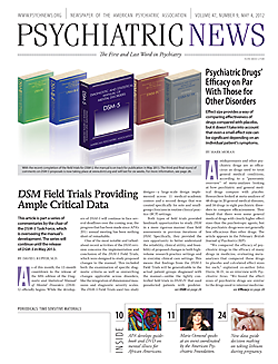Antidepressants and other psychiatric drugs are as efficacious as drugs used to treat general medical conditions, according to a “panoramic overview” of meta-analyses looking at how psychiatric and general medical drugs compare with placebo. Researchers looked at meta-analyses of 48 drugs in 20 general medical diseases, and 16 drugs in eight psychiatric disorders to compare efficaciousness. They found that there were some general medical drugs with clearly higher effect sizes than the psychotropic agents, but the psychiatric drugs were not generally less efficacious than other drugs. The article appears in the February British Journal of Psychiatry (BJP).
“We compared the efficacy of psychiatric drugs to the efficacy of many drugs in medicine, evaluating meta-analyses that compared these drugs to placebo and calculated effect sizes for each,” explained co-author John Davis, M.D., in an interview with Psychiatric News. “We found the effect sizes of psychiatric drugs are similar to the drugs used in internal medicine.
There are a few drugs that have really big effect sizes and there are more of those in internal medicine, but overall the efficacy is comparable.”
He is a professor of psychiatry at the University of Illinois, Chicago.
Davis and colleagues searched Medline and the Cochrane Library for systematic reviews on the efficacy of drugs compared with placebo for common general medical and psychiatric disorders, and systematically presented the effect sizes for primary efficacy outcomes. Medical conditions included hypertension, stroke, multiple sclerosis, ulcerative colitis, among others, as well as antibiotics for several different disorders; the eight psychiatric disorders were schizophrenia, major depressive disorder, acute mania, obsessive-compulsive disorder, panic disorder, dementia, bipolar affective disorder, and ADHD.
The median effect size of general medicine medication was 0.37 and the average was 0.45. The median effect size for psychiatric medications was 0.41 and the average was 0.49.
But Davis and colleagues emphasized that effect sizes alone should be not be interpreted too literally, noting that effect sizes serve only to provide a comparative context for different drugs’ effectiveness over placebo (adjusted for chance variability); they don’t take into account that even small effect sizes can offer significant improvement to individual patients depending on their specific symptoms, or that large effects on acute symptoms may also be accompanied by adverse side effects.
“Effect size measures the difference between drug and placebo divided by the standard deviation, but the difference they are measuring may vary depending on the patient’s perception of what is significant,” he said. “The degree of efficacy is about the same in many drugs, but labeling an effect size as small, medium, or large is just name-calling.”
Davis and colleagues wrote, “[T]he increment of improvement by a drug must be viewed in the context of the seriousness of the disease, the suffering induced, the outcome in question, societal values, and the natural course including the duration of the disease.”
The BJP study provides additional evidence refuting a 2008 study that appeared in the Journal of the Public Library of Science (PloS), which purported to show that antidepressants demonstrated superiority to placebo only in cases of severe depression. The PloS study had garnered much publicity, including coverage on “60 Minutes.” The BJP report joins a study that appeared in the Archives of General Psychiatry that also refuted the earlier PLoS report by using patient-level data to track response and remission rates over time. That report showed that fluoxetine and venlafaxine are efficacious for major depressive disorder in all age groups and that baseline severity was not significantly related to degree of treatment advantage over placebo (Psychiatric News, April 20).
“There are many reasons why doctors, patients, and caregivers are and should be critical about psychotropic drug treatment, such as unclear disease etiology, lack of diagnostic tests, commercial conflict of interest, unclear mechanism of drug action, and side effects,” Davis and colleagues concluded. “However, the efficacy of psychotropic drugs is supported by randomized, controlled trials. In this context we have put psychiatric drugs in the perspective of general-medicine medication.”

